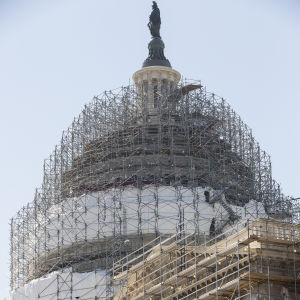The House of Representatives voted 207-143 against legislation Tuesday aimed at cutting off subsidies to help poor Americans buy mobile phone service under the Federal Communications Commission’s Lifeline program, otherwise known as the “Obama phone” program.
House Republicans failed to pass the End Taxpayer Funded Cell Phones Act under suspension of the rules, which requires two-thirds support.
The bill by Georgia Republican Rep. Austin Scott would have prevented the FCC from paying subsidies to wireless providers for voice and data services on behalf of poor Americans, who qualify for a $9.25 monthly subsidy to help cover the cost of service if they fall below a certain income level or qualify for other federal aid like food stamps.
“Waste, fraud and abuse” have been the most popular terms used to describe the program among Republicans in Congress and at the FCC since the early years of the Obama administration, when the program’s budget exploded from $819 million to $2.19 billion between 2008 and 2012 as a result of subscribers and wireless providers fraudulently enrolling multiple times.
The agency introduced reforms in 2012 and brought the budget down to $1.6 billion in 2014. Earlier this year FCC Chairman Tom Wheeler and his two fellow Democrats on the five-member commission voted to expand Lifeline to cover broadband internet and raise the program’s budget to an uncapped $2.25 billion.
Wheeler’s expansion was soon followed by the FCC’s largest fine ever leveled on a Lifeline provider of $51 million against Total Call Mobile for enrolling tens of thousands of duplicate and ineligible consumers. The provider did so by consistently overriding a database meant to flag and prevent duplicate enrollments.
Republican FCC Commissioner Ajit Pai’s office delved deeper into the tactic used by Total Call Mobile in May and found more than a dozen other Lifeline providers across the U.S. bypassed the National Lifeline Accountability Database (NLAD) to enroll subscribers flagged as duplicates in roughly one-third of all enrollments between October 2014 and February 2015.
Pai released the latest results of his investigation earlier this month, which revealed one-third of all enrollments — 4,291,647 people — between October 2014 and April 2016, or 35.3 percent, were enrolled by providers despite being flagged by the database.
According to the commissioner’s office, just one year of servicing duplicates costs taxpayers $476 million.
“We need to get to the bottom of it, and we need to route out the waste, fraud and abuse that’s persistent in the program for a long time after February 2015,” Pai said.
As part of the expansion, the FCC included the creation of a single database to act as a “National Eligibility Verifier,” comprised of income eligibility information from federal programs like SNAP and Medicaid. The subsidy is limited to one per household, and providers must ping the database to confirm a potential subscriber is eligible before enrollment.
Chairman Tom Wheeler previously characterized the current system of carriers certifying overrides as “the fox guarding the hen house,” and added he inherited the old system when he became chairman.
The plan calls for a proposal outlining the verifier system by December, and a deadline to have it up and running by 2019.
Pai pointed out during a congressional hearing in April the FCC’s last attempt at such a database failed to staunch the abuse, and added he wasn’t “all that much more optimistic” Wheeler’s new National Eligibility Verifier would be more successful.
“There is a database that currently carriers can override, and that’s part of the reason why we’re seeing some carriers now simply bypassing it, rejecting the no answer that they get from it, in order to sign up customers,” he said.
Tuesday’s defeat of the bill won’t mark the end of Republican efforts to reform the program — lawmakers in the Senate have already poked holes in Wheeler’s reform effort, and Austin himself has already proposed a separate bill to cap the program’s budget at $1.5 billion.
The wireless industry has also gotten onboard, lobbying against the budget cap in April and opposing Tuesday’s bill on the grounds wireless carriers shouldn’t be blocked from receiving the subsidy, since wireless customers help pay for the program via fees on their monthly phone bills to the FCC’s Universal Service Fund, which funds Lifeline.
“This approach is inequitable and if it is Congress’ desire to end wireless provider access to the USF programs, that effort should be matched with a dollar-for-dollar reduction in what wireless providers pay into the USF,” Meredith Attwell Baker, president of the wireless lobbying group CTIA, wrote to House leadership Tuesday.
“It also ignores America’s inexorable shift away from wireline and toward wireless service, and the reality that many of those the Lifeline program aims to help, like the homeless, simply cannot be served with wireline connections,” She wrote.

